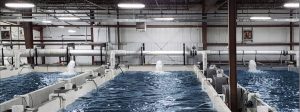 GOLD RIVER – The Federal Department of Fisheries and Oceans (DFO) has granted an Aquaculture Permit for Gold River Aquafarms (GRA), which has plans to develop a $100 million land-based steelhead fish farm on the decommissioned paper mill site in Gold River.
GOLD RIVER – The Federal Department of Fisheries and Oceans (DFO) has granted an Aquaculture Permit for Gold River Aquafarms (GRA), which has plans to develop a $100 million land-based steelhead fish farm on the decommissioned paper mill site in Gold River.
GRA President Rob Walker says planning for the project began three years ago and the application for regulatory approval was filed in February, 2021.
“This project which will be a significant economic boost to the Village of Gold River,” says Walker. “It will create other start-up venture opportunities and bolster the local economy in general, in addition to creating approximately 35 full time, good paying jobs in the first phase of our project.”
The 3,000 metric tonne steelhead farm will be the largest land-based facility in Canada when completed, with the potential to expand to 15,000 metric tonnes on the adjacent property. By repurposing t h e mill’s infrastructure, several large warehouses, water, and power, it will save the project approximately $15M in capital costs.
Mayor of Gold River Michael Lott says “We are thrilled to have an environmentally responsible and sustainable industry being developed here. Gold River offers a wonderful lifestyle of incredible outdoor activities in a naturally beautiful spot, on Vancouver Island, and an ecologically friendly and sustainable business that produces such a healthy product is a welcome addition to our economic and responsible development goals.”
The Canadian founders of GRA have been part of the design, development and management of 130 aquaculture facilities around the world. They are leaders in the development of a unique Recirculating Aquaculture System (RAS) which is a land-based technology that features unsurpassed environmental performance, the highest production capacities per unit area, reduced fish mortality, and the highest degree of control over production outcomes in the industry.
“Transitioning fish production from the marine environment reduces uncontrollable risks associated with climate change, such as algae blooms, severe storms, and temperature fluctuations that are the result of global warming,” states Walker. “GRA’s sustainable RAS systems are more resilient, have a smaller footprint on the water and land and reduce the time and distance between farm and fork. All this while using up to 50% less energy at a third less capital cost than other RAS systems on the market today.”
Azar Kamran, Chief Administrative Officer for Mowachaht/Muchalaht First Nation, says the Nation “is pleased to see the development of a fishery within our traditional territory that is clean and sustainable, and that offers employment opportunities and strengthens food security for the region.”
The controlled nature of land-based aquaculture production provides improved traceability, logistics, inventory management, product uniformity, demand response, and product quality, compared to wild-caught fish.
GRA is committed to growing healthy, disease-free fish containing no added hormones, no antibiotics, and no micro-plastics.


